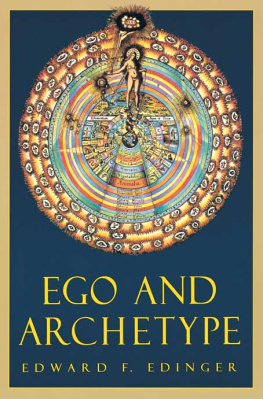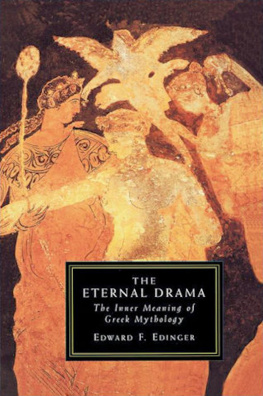ABOUT THE BOOK
This book is about the individuals journey to psychological wholeness, known in analytical psychology as the process of individuation. Edward Edinger traces the stages in this process and relates them to the search for meaning through encounters with symbolism in religion, myth, dreams, and art. For contemporary men and women, Edinger believes, the encounter with the self is equivalent to the discovery of God. The result of the dialogue between the ego and the archetypal image of God is an experience that dramatically changes the individuals worldview and makes possible a new and more meaningful way of life.
EDWARD F. EDINGER, M.D., a founding member of the C. G. Jung Foundation for Analytical Psychology in New York, is the author of many books on Jungian psychology, including The Eternal Drama and Anatomy of the Psyche: Alchemical Symbolism in Psychotherapy.
Sign up to receive news and special offers from Shambhala Publications.

Or visit us online to sign up at shambhala.com/eshambhala.
A. C. G. JUNG FOUNDATION BOOK
The C. G. Jung Foundation for Analytical Psychology is dedicated to helping men and women to grow in conscious awareness of the psychological realities in themselves and society, find healing and meaning in their lives and greater depth in their relationships, and to live in response to their discovered sense of purpose. It welcomes the public to attend its lectures, seminars, films, symposia, and workshops and offers a wide selection of books for sale through its bookstore. The Foundation also publishes Quadrant, a semiannual journal, and books on Analytical Psychology and related subjects. For information about Foundation programs or membership, please write to the C. G. Jung Foundation, 28 East 39th Street, New York, NY 10016.

Frontispiece
THE WORLD SOUL by Robert Fludd. The anima as personification of the ego-Self axis transmits guidance and support to the ego from the archetypal psyche. (Detail)
EGO & ARCHETYPE
Individuation and the Religious Function of the Psyche
Edward F. Edinger

SHAMBHALA
Boulder
2016
S HAMBHALA P UBLICATIONS , I NC .
4720 Walnut Street
Boulder, Colorado 80301
www.shambhala.com
1972 by the C. G. Jung Foundation for Analytical Psychology
All rights reserved. No part of this book may be reproduced in any form or by any means, electronic or mechanical, including photocopying, recording, or by any information storage and retrieval system, without permission in writing from the publisher.
LIBRARY OF CONGRESS CATALOGING-IN-PUBLICATION DATA
Edinger, Edward F.
Ego and archetype: individuation and the religious function of the psyche/Edward F. Edinger.1st Shambhala ed.
p. cm.
Reprint. Originally published: New York : Putnam, 1972.
A C. G. Jung Foundation book.
Includes bibliographical references and index.
eISBN 978-0-8348-2389-1
ISBN 0-87773-576-X
1. Individuation (Psychology) 2. Ego (Psychology)
3. Archetype (Psychology) 4. Psychoanalysis and religion. I. Title.
BF175.5.153 1991
150.1954dc20
90-53380
CIP
CONTENTS
ILLUSTRATIONS
PLATES
ACKNOWLEDGMENTS
This book is the result of a decade of thought and writing. Part I began as a small paper entitled The Ego-Self Paradox published in The Journal of Analytical Psychology, Vol. 5, No. 1, January 1960. It was later expanded and given as a series of lectures to the Analytical Psychology Clubs of New York (1962) and Los Angeles (1963), and in Montreal (1964). was originally a lecture given to the Analytical Psychology Club of New York (1969).
I am grateful to Doreen B. Lee for her skillful preparation of the manuscript, also to Rhoda Head, editor, and to the Publications Committee of the C. G. Jung Foundation. I acknowledge gratefully permission to use pictures from the following sources:
Muse Cond, Chantilly, for .
Museo del Prado, Madrid, for .
Princeton University Press for .
Pinacoteca di Brera, Milan, for .
British Museum, London, for .
Offentliche Bibliothek der Universitt Basel for the Frontispiece and Jacket.
National Press Books and Rhoda Kellogg for .
Michael Fordham for .
Church of the Carmine, Florence; photographer Alinari Fratelli, for .
Museum of Fine Arts, Brussels, for .
Pierpont Morgan Library for .
Museum of Fine Arts, Boston, for .
Dover Publications, Inc., New York, for .
Bibliotheque Nationale, Paris, for .
The courtesy of the Robert Lehman Collection, New York, for .
Cabinetto Fotografico Nazionale, Rome, for .
Phaidon Press Limited, London, for .
Philosophical Library for .
.
Kunsthistorisches Museum, Vienna, for .
Penguin Books, London, for .
To: Roloff Beny for photograph, .
National Gallery, London, for .
Uffizi, Florence, for .
Staatliche Museen, Berlin, for .
Peggy Guggenheim Foundation for .
Library of the Chemistry Department, University of St. Andrews, Scotland, for .
Robinson and Watkins Books, Ltd., London, for .
Staats Bibliotheque, Mnich, for .
I am grateful, too, for permission to quote as noted from the following:
Abingdon Press, from Roland H. Bainton, Here I Stand.
Academic Press, Inc., from Theatrum Chemicum Britannicum.
Basic Books, Inc., New York, 1958excerpt from Existence: A New Dimension in Psychiatry and Psychology.
Beacon Press, Boston, from The Gnostic Religion, copyright 1958, 1963, by Hans Jonas.
Guild of Pastoral Psychology, from Derek Kitchin, Guild Lecture No. 80, April 1954.
From The Wasteland in Collected Poems by T. S. Eliot, copyright 1936, by Harcourt Brace Jovanovich, Inc.; copyright 1963, 1964. Reprinted by permission of the publishers.
Harper and Row, Inc., New York, from Pierre Teilhard, The Phenomenon of Man.
Journal of Analytical Psychology, London, from Erich Neumann, The Significance of the Genetic Aspect for Analytical Psychology.
Methuen and Company, Ltd., London, from H. G. Baynes, Analytical Psychology and the English Mind.
Northwestern University Press, Evanston, Ill., from Rivkah Kluger, Satan in the Old Testament.
Oxford University Press, Inc., New York, from F. H. Bradley, Appearance and Reality; Gilbert Murray, The Rise of the Greek Epic; Rudolf Otto, The Idea of the Holy.
Random House, Inc., New York, from Swami Paramandenda, The Wisdom of China and India; Nancy W. Ross, The World of Zen; C. G. Jung, Memories, Dreams, Reflections.
Simon and Schuster, Inc., New York, from G. Ginsberg, Legends of the Bible.
Tavistock Publications, Ltd., London, from G. Adler (Ed.), Current Trends in Analytical Psychology.
University Books, Inc., Hyde Park, New York, from Francis Legge, Forerunners and Rivals of Christianity; A. E. Waite (Ed.), The Works of Thomas Vaughn.
University of Nebraska Press, Lincoln, Nebraska, from John G. Neihardt, Black Elk Speaks.
The Viking Press, Inc., New York, from Jean Doresse, The Secret Books of the Egyptian Gnostics, copyright 1960 by Hollis & Carter, Ltd.
John M. Watkins, London, from G. R. S. Mead, Fragments of a Faith Forgotten
Next page





